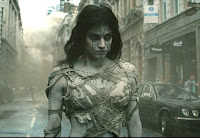Historical reference! It’s like a pop culture reference, but it lets you pass tests…
I’ve talked about
different genre issues a few times in the past. With the upcoming holiday, though, I thought it would be nice to revisit one that’s near and dear to me. To be more specific, I thought we could talk about the different forms of horror.
Anyone who’s dabbled in horror knows that, when we tell folks this is our chosen genre, our work tends to get lumped into this vague slasher/vampire/Satanist category. Either that or we’re tagged as someone working through
a collection of childhood issues. Most folks don’t realize horror can be broken down into many different sub-genres, just like drama or comedy or war stories. Just because
Resident Evil is under the umbrella (no pun intended) of horror doesn’t mean it’s anything like
It Follows, and neither of them resembles Bram Stoker’s
Dracula. Or Stephen King’s
Salem’s Lot. Or Craig DiLouie’s
Suffer The Children.
So, here’s a few different panels of that umbrella. Some of them are established sub-genres which have already been debated to death. Others are just things I’ve noticed and named on my own that I feel are worth mentioning.
Also, you may notice I’m defining a lot of these by how the characters in the story react/interact with the scary things. That’s deliberate. All stories are about characters, and horror stories hinge on that. One of the most common complaints we all hear about horror—to the point that it’s almost a joke—is when the characters do something that makes no sense. So how my characters act and react is going to have a lot of effect on the story I’m telling…
Supernatural stories—This is one of the easiest ones to spot. It’s your classic ghost story. The phone lines that fall into the cemetery. The pale girl out hitchhiking alone in the middle of night. The foul-smelling thing in the lower berth.
There are a few key things you’ll notice about these. One of the biggies is that the protagonist rarely comes to harm in a supernatural story. Their underwear will need to go through the wash three or four times and they may not sleep well for years afterwards, but physically, and even mentally, they tend to come out okay. If anyone suffers in a supernatural story it’s usually the bad guy or some smaller character. Also, these stories tend not to have explanations– they just are. There aren’t any cursed objects or ancient histories at play. Things happen because… well, they happen.
The Sixth Sense is still a great example of a supernatural story, as is “A Christmas Carol” by that populist hack Charles Dickens. Even the
Pirates of the Caribbean franchise is more supernatural stories than anything else.
Giant Evil stories—These are the grim tales when the universe itself is against my characters. Every person they meet, everything they encounter–it all serves some greater, awful evil. H.P. Lovecraft and Robert Howard wrote a lot of
giant evil stories.
The Omen is another good (so to speak) story of the universe turning against the protagonist. Any fan of Sutter Cane will of course remember the reality-twisting film
In The Mouth of Madness. In a way, most post-apocalyptic stories fall here, too—the world belongs to radioactive mutants, the killer virus, or
the zombie hordes.
Personally, I’d toss a lot of haunted house stories in here, because the haunted house (or ship, or insane asylum, or spaceship, or whatever) is essentially the universe of the story. Not all of them, but a decent number. The reader or audience doesn’t see anything else and the characters don’t get to interact with anything else.
House on Haunted Hill, The Shining, Event Horizon, and most of the
Paranormal Activity films could all be seen as supernatural stories, but their settings really elevate them to giant evil stories.
Thrillers—Thrillers also stand a bit away from the pack because they tend to be the most grounded of horror stories. Few creatures of the night, no dark entities, far fewer axe-wielding psychopaths. The key thing to remember is that a thriller is all about
right now. It’s about
the clock counting down in front of my heroine, the killer hiding right there in the closet, or the booby trap that’s a razor-width from going off and doing… well, awful things to my characters. There’s a lot of suspense focused on one or two characters and it stays focused on them for the run of my story. A thriller keeps the characters (and the reader) on edge
almost every minute.
Slasher stories—These are really about one thing, and that’s body count. How many men, women, and fornicating teens can the killer reduce to cold meat? Note that there’s a few distinctions between a slasher story and a torture porn story (see below), and one of them is usually the sheer number of people killed. There’s also often a degree of creativity and violence to the deaths, although it’s important to note it’s rarely deliberate or malicious. Often it’s just the killer using the most convenient tools at hand for the job—slasher tales are pretty much a parkour of death. The original Friday the 13th film series has pretty much become the standard for slasher pics, and it’s what most people tend to think of first when you mention the term.
A lot slasher stories used to have a mystery sub-element to them, and often it was trying to figure out who the killer was. Then it kind of morphed into being a twist… alas, often not a very well-done one. Slasher stories also developed a bad habit of falling back on the insanity defense and got stereotyped as “psycho-killer” movies. Which is a shame because some of them are actually very clever and creepy.
Monster stories—The tales in this little sub-genre tend to be about unstoppable, inescapable things that mean the protagonist harm. They’re rarely secretive or mysterious, but they do have an alarming habit of tending toward nigh-immortality. The emphasis here is that nothing my heroes (or the villains, police, military, or the innocent bystanders) do can end this thing’s rampage, and any worthwhile rampage tends to involve people dying. There may be blood and death, but the focus with a monster isn’t finding it or learning about it–
it’s stopping it. Or at least getting as far away from it as possible. Of course, how far is far enough with something that doesn’t stop?

The original monster story is, of course,
Frankenstein.
Godzilla is a monster, in a very obvious sense, but so are zombies, Samara in
The Ring, and even Freddy Kruger. I still hold that the reason
Jason X is so reviled by fans of the franchise is that the filmmakers turned it into a monster movie, not a slasher film like the ones before it.
My lovely lady also made an interesting observation recently. In monster stories, you almost always have a moment when the audience feels a twinge of sympathy for the monster. Look at any of those named above, and you’ll see there’s a point when we empathize with Frankenstein, Godzilla, and yeah… even super-killer cyborg Jason (who seems to settle down once a holodeck dumps him back at a deserted and lonely Camp Crystal Lake and you realize he just wants to be left alone).
Adventure Horror stories—To paraphrase from
Hellboy (which would fit quite well in this category), adventure horror is where the good guys bump back. While they may use a lot of tropes from some of the other subgenres, the key element to these stories is that the heroes are fighting back. Not in a weak, flailing, shrieking cheerleader way, but in a
trained, heavily-armed, we’ve-got-your-numberway. Oh, it can still go exceptionally bad for them (and often does), but this sub-genre is about protagonists who get to
inflict a bit of damage and live to tell the tale. For a while, anyway. To quote an even wiser man, even monsters have nightmares.

The
Resident Evil franchise is horror adventure with zombies, just like my own
Ex-Heroes. Jonathan Maberry’s definitely dabbled in it as well, with some of his eerier Joe Ledger books. The
Ghostbustersmovies could fit here, too. There’s long-running shows like
Grimm and
Supernatural, and some of you may have seen a fun little cable series called
Ash vs. Evil Dead.
Torture porn—Director
Paul Verhoven once commented that
the reason Murphy is killed so brutally in the beginning of
Robocop was because there wasn’t time at the start of the film to
develop him as a character. So they gave him a horribly gruesome death, knowing it would create instant sympathy for him, and then they’d be able to fill in more details about his life later on in the film. That’s the general idea behind torture porn. Minus the filling in more details about the characters later.
I’m not sure if King himself actually coined the term “torture porn” in his Entertainment Weekly column, but that’s the first place I remember seeing it. At its simplest, torture porn is about making the reader or the audience squirm. If you can make them physically ill, power to you. The victims are usually underdeveloped, unmemorable, and doomed from the moment they’re introduced. It’s not about characters, it’s about the visceral things being
done to the characters. They’re getting skinned, scalped, boiled, slowly impaled, vivisected… and we’re getting every gory detail of it. A film industry co-worker
once told me “porn is when you show everything,” and this sub-genre really is about
leaving nothing to the imagination. They are the anti-thriller, to put it simply.
A key element to torture porn is the victim is almost always helpless. They’re bound, drugged, completely alone, or vastly outnumbered. Unlike a slasher film– where there’s always that sense that Dot might escape if she just ran a little faster or make a bit less noise– there is no question in these stories that the victim is not going to get away. That hope isn’t here, because that’s not what these stories are about.
So there’s seven subgenres we can break horror down into. And there’s many more. All fascinating stuff, right?
Why are we talking about it?

Y’see, Timmy, when a lot of us start off as writers, we flail a bit, usually in the attempt to copy stories
we don’t quite understand the mechanics of. As such, we aren’t sure where our own stories fit under the big horror umbrella (or sci-fi, or fantasy, or…). We’ll begin a tale in one sub-genre, then move into a plot more fitting a different one, wrap up with
an ending that belongs on a third, and have the tone of yet another through the whole thing.
It’s important to know what I’m writing for two different reasons. One is so I’ll be true to it and don’t end up with a sprawling story that covers everything and goes nowhere. I don’t want my thriller to degenerate into a slasher, and if I’m aiming for cosmic-level,
Lovecraftian evil it’d be depressing to find all the earmarks of a classic supernatural story. I also want to be able to market my story, which means I need to know what it is. If I tell an editor it’s not torture porn when it plainly is, at the best
I’m going to get rejected. At the worst, they’ll remember me as “that idiot” when my next piece crosses their desk.

In closing, I’ll also toss in the free observation that it’s difficult to merge two of these subgenres because a lot of them contradict each other by their very nature. Not impossible, mind you, but difficult. Probably one of the few exceptions I can think of in recent times is
The Cabin In The Woods, which does an amazing dancing back and forth between being a monster movie and a giant evil movie.
So, that’s enough of that. Feel free to dwell on these points over the weekend while you’re drinking, watching some scary movies, and sneaking Kit Kats out of the candy bowl (seriously—feel ashamed about that. Those are for the kids!)
Next time… I thought we could talk a little bit about democracy.
Happy Halloween. Don’t forget to get some writing done.
















